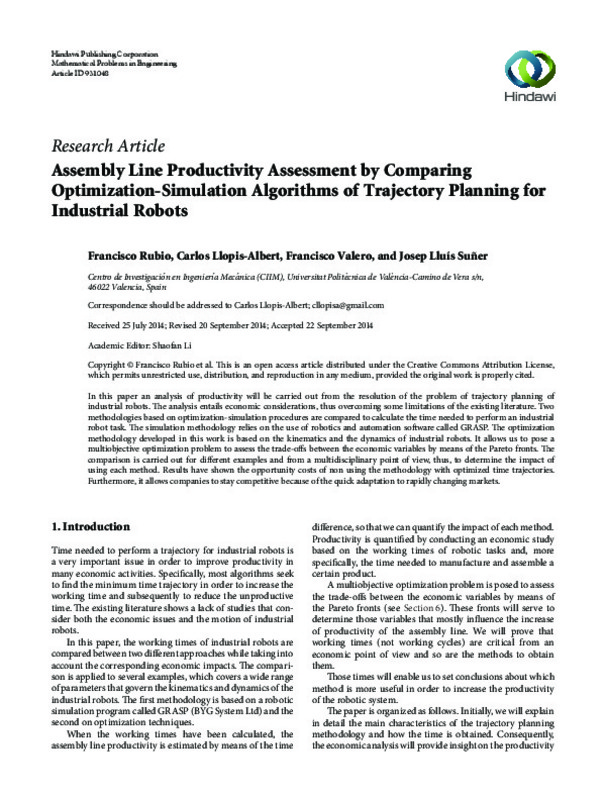JavaScript is disabled for your browser. Some features of this site may not work without it.
Buscar en RiuNet
Listar
Mi cuenta
Estadísticas
Ayuda RiuNet
Admin. UPV
Assembly Line Productivity Assessment by Comparing Optimization-Simulation Algorithms of Trajectory Planning for Industrial Robots
Mostrar el registro sencillo del ítem
Ficheros en el ítem
| dc.contributor.author | Rubio Montoya, Francisco José
|
es_ES |
| dc.contributor.author | Llopis Albert, Carlos
|
es_ES |
| dc.contributor.author | Valero Chuliá, Francisco José
|
es_ES |
| dc.contributor.author | Suñer Martinez, Josep Lluis
|
es_ES |
| dc.date.accessioned | 2018-06-01T04:22:05Z | |
| dc.date.available | 2018-06-01T04:22:05Z | |
| dc.date.issued | 2015 | es_ES |
| dc.identifier.issn | 1024-123X | es_ES |
| dc.identifier.uri | http://hdl.handle.net/10251/103132 | |
| dc.description.abstract | [EN] In this paper an analysis of productivity will be carried out from the resolution of the problem of trajectory planning of industrial robots. The analysis entails economic considerations, thus overcoming some limitations of the existing literature. Two methodologies based on optimization-simulation procedures are compared to calculate the time needed to perform an industrial robot task. The simulation methodology relies on the use of robotics and automation software called GRASP. The optimization methodology developed in this work is based on the kinematics and the dynamics of industrial robots. It allows us to pose a multiobjective optimization problem to assess the trade-offs between the economic variables by means of the Pareto fronts. The comparison is carried out for different examples and from a multidisciplinary point of view, thus, to determine the impact of using each method. Results have shown the opportunity costs of non using the methodology with optimized time trajectories. Furthermore, it allows companies to stay competitive because of the quick adaptation to rapidly changing markets. | es_ES |
| dc.description.sponsorship | This paper has been possible due to the funding from the Science and Innovation Ministry of the Spanish Government by means of the Researching and Technologic Development Project DPI2010-20814-C02-01 (IDEMOV). | en_EN |
| dc.language | Inglés | es_ES |
| dc.publisher | Hindawi Limited | es_ES |
| dc.relation.ispartof | Mathematical Problems in Engineering | es_ES |
| dc.rights | Reconocimiento (by) | es_ES |
| dc.subject | Productivity | es_ES |
| dc.subject | Trajectory planning | es_ES |
| dc.subject | Pareto fronts | es_ES |
| dc.subject | Optimization | es_ES |
| dc.subject.classification | INGENIERIA MECANICA | es_ES |
| dc.title | Assembly Line Productivity Assessment by Comparing Optimization-Simulation Algorithms of Trajectory Planning for Industrial Robots | es_ES |
| dc.type | Artículo | es_ES |
| dc.identifier.doi | 10.1155/2015/931048 | es_ES |
| dc.relation.projectID | info:eu-repo/grantAgreement/MICINN//DPI2010-20814-C02-01/ES/IDENTIFICACION DE PARAMETROS DINAMICOS EN VEHICULOS LIGEROS Y ROBOTS MOVILES. APLICACION A LA IDENTIFICACION EN TIEMPO REAL./ | es_ES |
| dc.rights.accessRights | Abierto | es_ES |
| dc.contributor.affiliation | Universitat Politècnica de València. Departamento de Ingeniería Mecánica y de Materiales - Departament d'Enginyeria Mecànica i de Materials | es_ES |
| dc.description.bibliographicCitation | Rubio Montoya, FJ.; Llopis Albert, C.; Valero Chuliá, FJ.; Suñer Martinez, JL. (2015). Assembly Line Productivity Assessment by Comparing Optimization-Simulation Algorithms of Trajectory Planning for Industrial Robots. Mathematical Problems in Engineering. (931048):1-10. https://doi.org/10.1155/2015/931048 | es_ES |
| dc.description.accrualMethod | S | es_ES |
| dc.relation.publisherversion | https://doi.org/10.1155/2015/931048 | es_ES |
| dc.description.upvformatpinicio | 1 | es_ES |
| dc.description.upvformatpfin | 10 | es_ES |
| dc.type.version | info:eu-repo/semantics/publishedVersion | es_ES |
| dc.description.issue | 931048 | es_ES |
| dc.relation.pasarela | S\290075 | es_ES |
| dc.contributor.funder | Ministerio de Ciencia e Innovación | es_ES |








